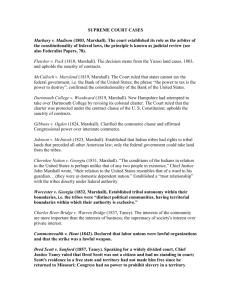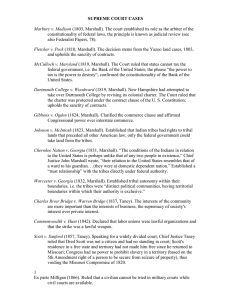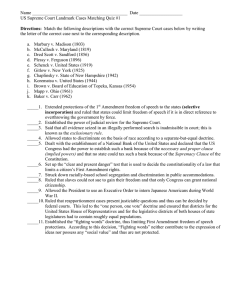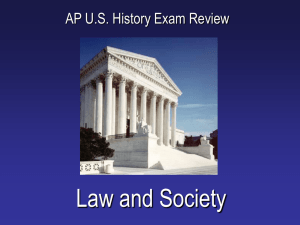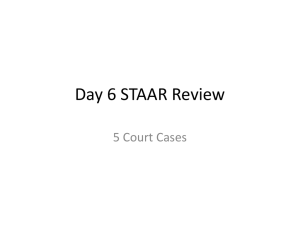AP Review: SUPREME COURT CASES
advertisement
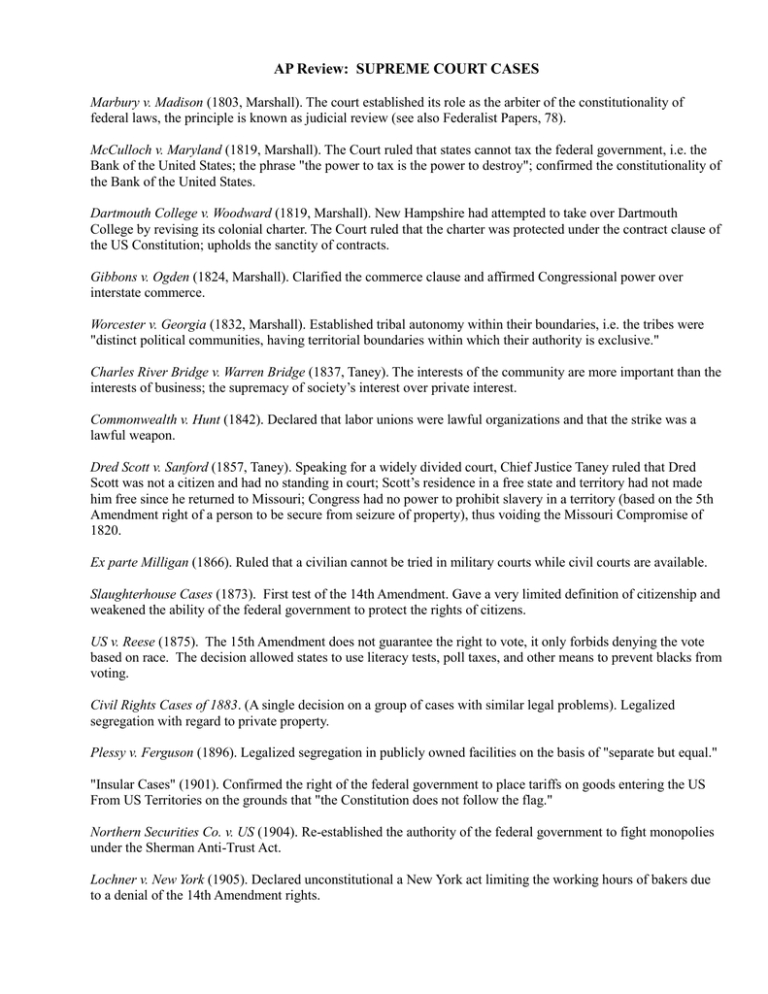
AP Review: SUPREME COURT CASES Marbury v. Madison (1803, Marshall). The court established its role as the arbiter of the constitutionality of federal laws, the principle is known as judicial review (see also Federalist Papers, 78). McCulloch v. Maryland (1819, Marshall). The Court ruled that states cannot tax the federal government, i.e. the Bank of the United States; the phrase "the power to tax is the power to destroy"; confirmed the constitutionality of the Bank of the United States. Dartmouth College v. Woodward (1819, Marshall). New Hampshire had attempted to take over Dartmouth College by revising its colonial charter. The Court ruled that the charter was protected under the contract clause of the US Constitution; upholds the sanctity of contracts. Gibbons v. Ogden (1824, Marshall). Clarified the commerce clause and affirmed Congressional power over interstate commerce. Worcester v. Georgia (1832, Marshall). Established tribal autonomy within their boundaries, i.e. the tribes were "distinct political communities, having territorial boundaries within which their authority is exclusive." Charles River Bridge v. Warren Bridge (1837, Taney). The interests of the community are more important than the interests of business; the supremacy of society’s interest over private interest. Commonwealth v. Hunt (1842). Declared that labor unions were lawful organizations and that the strike was a lawful weapon. Dred Scott v. Sanford (1857, Taney). Speaking for a widely divided court, Chief Justice Taney ruled that Dred Scott was not a citizen and had no standing in court; Scott’s residence in a free state and territory had not made him free since he returned to Missouri; Congress had no power to prohibit slavery in a territory (based on the 5th Amendment right of a person to be secure from seizure of property), thus voiding the Missouri Compromise of 1820. Ex parte Milligan (1866). Ruled that a civilian cannot be tried in military courts while civil courts are available. Slaughterhouse Cases (1873). First test of the 14th Amendment. Gave a very limited definition of citizenship and weakened the ability of the federal government to protect the rights of citizens. US v. Reese (1875). The 15th Amendment does not guarantee the right to vote, it only forbids denying the vote based on race. The decision allowed states to use literacy tests, poll taxes, and other means to prevent blacks from voting. Civil Rights Cases of 1883. (A single decision on a group of cases with similar legal problems). Legalized segregation with regard to private property. Plessy v. Ferguson (1896). Legalized segregation in publicly owned facilities on the basis of "separate but equal." "Insular Cases" (1901). Confirmed the right of the federal government to place tariffs on goods entering the US From US Territories on the grounds that "the Constitution does not follow the flag." Northern Securities Co. v. US (1904). Re-established the authority of the federal government to fight monopolies under the Sherman Anti-Trust Act. Lochner v. New York (1905). Declared unconstitutional a New York act limiting the working hours of bakers due to a denial of the 14th Amendment rights. Muller v. Oregon (1908). First case to use the "Brandeis brief"; recognized a 10-hour workday for female laundry workers on the grounds of health and community concerns. Schenck v. US (1919). Unanimously upheld the Espionage Act of 1917 which declared that people who interfered with the war effort were subject to imprisonment; declared that the 1st Amendment right to freedom of speech was not absolute; free speech could be limited if its exercise presented a "clear and present danger." Adkins v. Children’s Hospital (1923). Declared unconstitutional a minimum wage law for women on the grounds that it denied women freedom of contract. Schechter v. US (1936). Sometimes called "the sick chicken case." Unanimously declared the National Industrial Recovery Act (NIRA) unconstitutional on three grounds: that the act delegated legislative power to the executive; that there was a lack of constitutional authority for such legislation; and that it sought to regulate businesses that were wholly intrastate in character. Korematsu v. US (1941). The court upheld the constitutionality of detention camps for Japanese-Americans during World War 2. Brown v. Board of Education of Topeka, Kansas (1954, Warren). Unanimous decision declaring "separate but equal" schools a violation of the 14th Amendment right to equal protection of the laws. Gideon v. Wainwright (1963). Extends to the defendant the right of counsel in all state and federal criminal trials regardless of their ability to pay. Griswold v. Connecticut (1965) The court ruled that a right to privacy exists and that government regulation of birth control violates this right. Miranda v. Arizona (1966). The court ruled that those subjected to in-custody interrogation be advised of their constitutional right to an attorney and their right to remain silent. Roe v. Wade (1973). The court legalized abortion by ruling that state laws could not restrict it during the first three months of pregnancy. Based on 4th Amendment rights of a person to be secure in their persons. US v. Richard Nixon (1974). The court rejected Richard Nixon’s claim to an absolutely unqualified executive privilege against any judicial process. Marbury v. Madison (1803) McCulloch v. Maryland (1819) Dartmouth College v. Woodward (1819) Gibbons v. Ogden (1824, Marshall) Worcester v. Georgia (1832, Marshall) Charles River Bridge v. Warren Bridge (1837) Commonwealth v. Hunt (1842) Dred Scott v. Sanford (1857) Ex parte Milligan (1866) Slaughterhouse Cases (1873) US v. Reese (1875) Civil Rights Cases of 1883 Plessy v. Ferguson (1896) "Insular Cases" / Downes v. Bidwell (1901) Northern Securities Co. v. US (1904) Lochner v. New York (1905) Muller v. Oregon (1908) Schenck v. US (1919) Adkins v. Children’s Hospital (1923) Schechter v. US (1936) Korematsu v. US (1941) Brown v. Board of Education (1954) Mapp v. Ohio, (1960) Gideon v. Wainwright (1963) Griswold v. Connecticut (1965) Miranda v. Arizona (1966) Roe v. Wade (1973) US v. Richard Nixon (1974) 2
